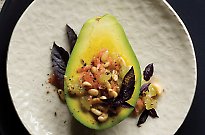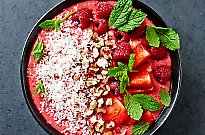
Why you need avocado in your diet

Discover all the benefits.
The humble avocado is one of the mightiest green things on the planet and Sarah Hutchings shows why you need to smash it into your diet.
They boast an astounding 20 vitamins and minerals, are gluten, sodium, sugar and cholesterol free and offer not only fibre but protein – something almost unheard of in fruit. Ladies and gentlemen, let’s show some massive respect to the humble-looking avocado.
Granted, they were not at the front of the queue when looks were dished out; the dragon fruit or rambutan win that battle hands down. And yet the avocado, or alligator pear as it’s also known, is in a league of its own when it comes to number of adoring fans, level of consumption, and, most importantly, unique health benefits.
Let’s start with a brief history of what’s become a supermarket basket regular for so many of us. In Central Mexico, eating avocados goes back some 10,000 years. It was considered so potent that its original name is said to come from the Nahuatl Indian word áhuacatl, which actually means testicle. Sorry if that’s put you off a little.
We have the Spanish to thank for bringing this superfood back from their conquests. Spain was actually where my own first encounter with what is now one of my favourite foods took place. I was 17 and thought it was a poor excuse for a local cheese that had been chucked into my salad. I hated pretty much everything; the texture, the taste, the colour and especially the not knowing what it actually was.
Fast forward a couple of decades and the avocado’s meteoric rise to A-list celeb status in the nutrition world has been nothing short of incredible. Now, you’ll find even the smallest café offers something with avocado on its menu – there are even entire bars and restaurants opening up exclusively in its honour.
Some people have gone so far as to declare that they’re one of the only foods that we could live off. Seems a bit extreme to forego all the other delicious things we can eat, but we get the gist: avocados are really, really good for us.
An unbeatable nutritional CV
So, what makes the avocado so great? Well, as it turns out, that’s a very long list... Avocados are made up of 73 per cent water, 15 per cent fat, 8.5 per cent carbohydrates (mostly fibre) and two per cent protein. Half an average-size avocado contains around 110 calories. Somehow, within its compact dimensions, the avocado manages to provide us with vitamin K (26 per cent of RDA), folate, which is especially important for pregnant women (20 per cent), vitamin C (17 per cent), vitamin B5 (14 per cent), vitamin B6 (13 per cent) and vitamin E (10 per cent). It also contains copper, iron, magnesium, manganese, phosphorous, zinc, vitamin A, B1 (thiamine), B2 (riboflavin) and B3 (niacin). This ideal vitamin and mineral combo means avocados are beneficial to our eye function, skin, immune system, circulation, hair and more.
But that’s not all: avocados boast twice the potassium of bananas (to be fair though, bananas are a quicker and easier alternative for tennis players to tuck in to mid-match). Increasing potassium intake has been shown to reduce blood pressure in people with hypertension, thus decreasing the risk of stroke.
Almost 80 per cent of the calories in avocados come from fat, making it one of the fattiest plant foods in existence. But, before you think of using this useful little fact as justification to grab some Oreos instead, hold the phone: it’s a different kind of fat entirely, and this is really the avocado’s star feature.
The majority of the fat in avocados is the heart-healthy monounsaturated kind, more specifically oleic acid, which is also the main component in olive oil. This type of fat is all good news. Not only has it been linked to reduced inflammation, making it ideal for arthritis or osteoporosis sufferers, it also lowers cholesterol levels, decreasing your chances of heart disease.
Optimum absorption
Here’s another great thing about the kind of fat found in avocados – it helps you absorb nutrients from other foods. You see, when it comes to the nutritional content of what we eat, the amount of iron, vitamin A, calcium, etc. a food contains is only one part of the puzzle. We also need to be able to absorb the nutrients properly and take them where they need to go in our bodies, and this is often the trickiest part to get right.
Some nutrients are what’s known as ‘fat soluble’, meaning that we can only use them if they’re combined with fat. Why are we not told all this in school? Basically put, vitamins A, D, E and K, along with some antioxidants such as carotenoids, need fat in order to be absorbed. One study proved that by adding avocado or cold-pressed avocado oil to a salad or meal, we can absorb anywhere between 2.6 and 15 times more antioxidants, meaning that not only is avocado highly nutritious in its own right, it also spreads its magic by increasing the nutritional value of other plant foods. Impressive, right?
Tricks to up your consumption
There are endless ways to introduce or increase the amount of avocado in your diet, both sweet and savoury. A quick internet search for avocado recipes should give you plenty of inspiration. But how to get avocado goodness into your sceptical children, reluctant partners or even yourself, if anything beyond guacamole is a no-no?
Tip number one is, as with most things in life, to add some chocolate and see how much better everything looks. Avocados are surprisingly delicious mixed with cocoa powder and feature in some seriously gooey and delicious desserts.
Really can’t stand them? Fair enough. These superheroes can be beneficial in other ways too – mash them up and apply to your face and hair for a deeply hydrating treatment. In simple terms, few things rival the avocado when it comes to healthy eating. Get some on your plate, in your salad, on your hair and in your lives now


